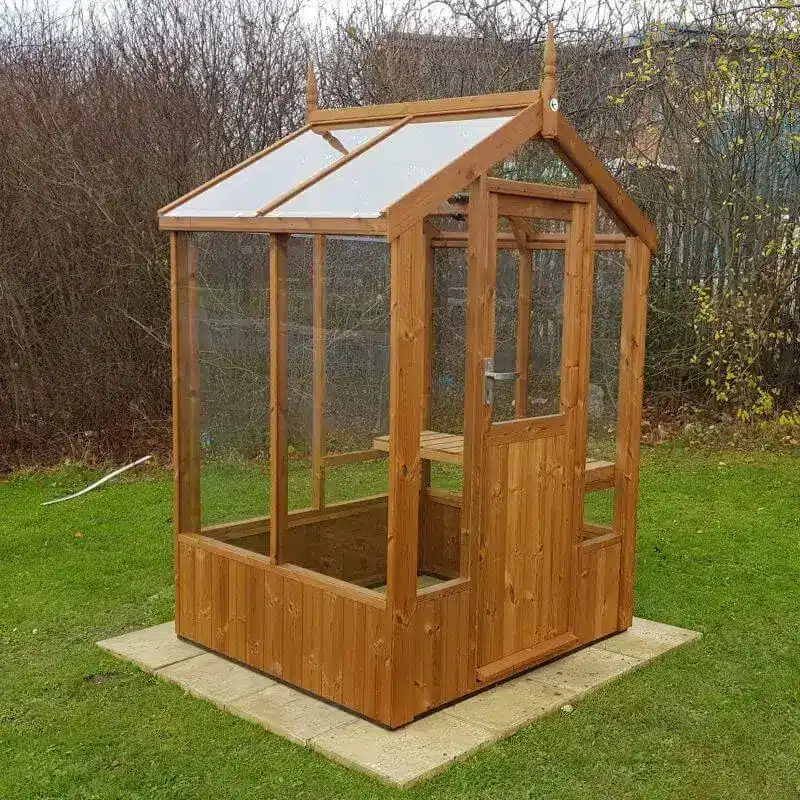A wooden greenhouse can be an asset for your organic gardening endeavors. It provides an ideal environment for your plants, adding a touch of natural beauty to your garden space. Wood allows for better breathability and airflow compared to concrete or glass.
Did you know that proper airflow is crucial for organic gardening as it helps prevent excessive humidity and condensation? It also reduces the risk of diseases and promotes healthy plant growth.
Good airflow helps with pollination and prevents the buildup of stagnant air. Stagnant air can create a favorable environment for fungal infections and the development of harmful bacteria.
Buying A Wooden Greenhouse
If you’re considering investing in a wooden greenhouse, you’re likely interested in durability and aesthetic appeal. The team at South West Greenhouses recommend buying a greenhouse made from treated timber, as that way when it’s left outside, the wood will be less likely to rot and require less maintenance. The alternative to this would be an aluminium greenhouse, but these aren’t as traditional.
“Swallow 4′-7 x 4′-3 Lark Greenhouse from South West Greenhouses”
Benefits of Using Wooden Greenhouses
Wooden greenhouses combine tradition with a commitment to sustainability. They offer distinctive advantages, particularly for organic gardening enthusiasts. Here are some benefits of using wooden greenhouses for organic gardening:
1. Undeniable Natural Beauty
Wooden greenhouses present an unquestionable charm that distinguishes them from other options. Their natural aesthetic appeal lets them blend effortlessly into the landscape. Unlike the stark contrast often presented by plastic or aluminum structures, a wooden greenhouse appears as a natural extension of the garden.
A wooden greenhouse enhances the overall beauty of your garden, complementing its green hues with a soft, wooden palette. They also create a warm, inviting, and peaceful atmosphere. Whether tending to your organic plants or soaking in the tranquility of the surroundings, you can make this space your sanctuary.
On the other hand, ensure the wood is properly treated or stained to protect it from moisture damage. Additionally, consider the size and orientation of the greenhouse to optimize sunlight exposure for your plants.
2. Exceptional Insulation Capabilities
Insulation is crucial when creating the ideal environment for your plants. Wooden greenhouses outperform their aluminum and plastic counterparts due to the natural insulating properties of wood.
Wooden greenhouses provide a consistent and stable environment for your organic plants. Wood can keep the greenhouse warmer in the winter and cooler in the summer, which is essential for the healthy growth of your plants. Consistent temperature regulation helps to reduce plant stress, ensuring they can flourish regardless of the season.
What’s more, wooden greenhouses excel in maintaining ideal humidity levels. Wood naturally absorbs excess moisture when humidity levels rise and releases it back into the environment when conditions are drier. Its natural absorption and release cycle aids in preventing condensation build-up, mitigating the risk of diseases and pests.
3. Eco-Friendly And Sustainable
Choosing a wooden greenhouse for organic gardening is more than just a practical decision. It’s a commitment to eco-friendly and sustainable practices. Unlike plastic or metal, wood is a renewable resource.
Wood blends well with natural surroundings and adds a rustic charm to your garden. However, ensure that the wood used for your greenhouse is responsibly sourced, with forestry practices that preserve biodiversity and support the health of the forests.
Meanwhile, wooden greenhouses have a lower carbon footprint than their plastic or metal counterparts. The process of producing timber requires less energy and emits fewer greenhouse gases than the manufacturing of plastic or metal.
4. Customizable and Adaptable
Gardening is a personal journey reflecting your style, tastes, and preferences. Hence, customizing your greenhouse can add a unique touch to your garden. Wooden greenhouses offer a range of customizable and adaptable features that are difficult to match with other materials.
One of the advantages of wood is its versatility. You can create various designs—whether you prefer a traditional apex-roofed structure or a modern, flat-roofed model. You can also select the size, shape, and layout of your wooden greenhouse to suit your needs and your garden’s available space.
Have you ever dreamed of adding decorative details, such as intricate latticework or personalized signage? Wooden greenhouses fit perfectly to these kinds of modifications. The same goes for practical features, like additional shelving, hanging planters, or a potting bench. Wood is easier to work with than metal or plastic, allowing for simple installation of these add-ons.
Final Thoughts
Wooden greenhouses add a touch of natural charm to your garden. Aside from that, they provide natural insulation, helping to maintain a stable and favorable environment for your plants. Also, wood allows for better breathability and airflow, reducing the risk of diseases and promoting healthy plant growth.
Furthermore, wooden greenhouses provide flexibility in terms of customization, allowing you to create an efficient and organized gardening space. They’re often made from sustainable materials, aligning with the principles of organic gardening and sustainability. Overall, they keep your plants thriving while helping the environment.
